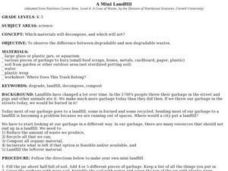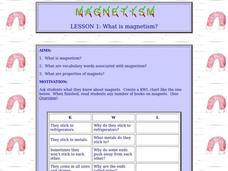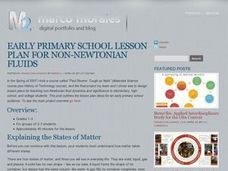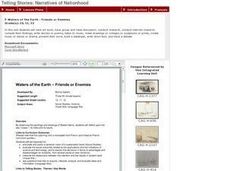Curated OER
Smelly Balloons
Students investigate the concept of diffusion through a membrane. They do this through the conduction of a simple experiment. Students make observations while determining if the smell of different chemicals seeps through the balloon...
Curated OER
One Part A Mini Lab: Water Contamination
High schoolers investigate the effects of ground water contamination. In this ground water contamination lesson plan, students create a mini well and simulate ground water flow through the well with a contaminate (food coloring). They...
Curated OER
A MINI LANDFILL
Students observe the difference between degradable and non-degradable wastes. They create their own landfill in a jar by adding four or five pieces of garbage and then covering it with dirt and water. They make observations on what they...
Curated OER
QuickPlan: Mystery Boxes
Primaries explore the concepts of observation and inference. Given a set of six sealed boxes, children lift, tip, or gently shake in order to make observations about what is inside. The lesson plan gives preparation instructions in...
Curated OER
What is Magnetism?
Students investigate magnetism. For this physics lesson, students create a KWL chart about magnetism and research various suggested websites to find out more about magnetism. Students log on to the "BrainPOP" website and view a short...
Curated OER
Rusting, Burning and Oxygen
In this rusting, burning and oxygen worksheet, students read about chemical reactions and are given diagrams of a rusting bicycle, a burning candle, and a variety of chemical changes. Students make observations and explain the chemical...
Curated OER
Coffee Ground Dinosaur Fossil Prints
Students create fossils to understand how scientists learn about dinosaurs. For this dinosaur lesson, students mix ingredients to make dough and put in objects that can make impressions. Students let fossil dry overnight....
Curated OER
Labs from YSI 95: Telescopes
Students build a telescope and give quantification of its magnification and field of view while making observations regarding images. In this telescope lesson, students use a simple lens to project a scene and examine various telescope...
Curated OER
Gravity Gets You Down
Students investigate the force of gravity and how it effects different objects that are put into acceleration when applied the experiment of free falling. They drop different objects that have a variety of masses and some that cause air...
Curated OER
Activity 3: Using Photo Images to Explore Life on the Ocean Floor
Students work in groups with copies of the three photo images provided with the instructional activity. They make observations about mussels and clams. Students discuss reasons scientists use a representative sample of a population...
Curated OER
The Effects of Temperature on Chemical Mixtures
Students explore chemical cahnges and the effect of temperature on chemical mixturees, They make observations of the behavior and appearance of certain chemical mixtures and reactions.
Curated OER
Stalactites And Stalagmites
High schoolers conduct a scientific investigation about the formation of stalactites and stalagmites. They conduct an experiment to reproduce them in the lab environment. Students make observations over a period of time in order to see...
Curated OER
Fossils
Fifth graders study the characteristics of fossils. They create a chart comparing the different fossil size, shape and texture. Students make observations and describe fossil characteristics in journals.
Curated OER
Earth Rotation
Learners examine the rotation of the Earth as it occurs in the 24 hour cycle. They use models of planets and the globe to make observations of movements made. Students brainstorm prior knowledge and then participate in a demonstration of...
Curated OER
Non-Newtonian Fluids
Students will use water, cornstarch, eggs, and more to explore the different states of matter. They will make observations of an unknown substance called "Oobleck" and test its liquid and solid properties. This would be a great lesson to...
Curated OER
Electromagnetic Energy and Its Spectrum
Your older elementary students investigate electromagnetic energy and the electromagnetic spectrum. They will observe 7 items represented in the electromagnetic spectrum and make a poster of all the things the items have in common. After...
Virginia Department of Education
Freshwater Food Chains
What's in the water? Encourage your class to further explore this question and learn about pond ecosystems, food chains, and food webs as they complete this hands-on activity. They view the environment from a new perspective...
Chymist
Build a Spectroscope
Assist your emerging scientists with construction of their very own spectroscopes. Individuals construct a spectroscope to identify elements used in varying lights within a particular environment. They conclude the activity with a...
Virginia Department of Education
Atomic Structure: Periodic Table
The fifth lesson of seven in the series outlines an in-depth analysis of the periodic table. After direct instruction, pupils take turns practicing in the group before beginning independent study. The assessments include a...
Curated OER
Waters of the Earth - Friends or Enemies
High Schoolers observe the paintings and drawings of Robert Harris, and do a study of the ocean that delves into human and physical geography. Learners make prints, listen to music, create a database, and perform research on a specific...
Curated OER
Pharaoh Mountain Hike: Investigating Adirondack Life Zones
Students hike a local mountain and examine its life zones. They measure various components at each zone and collect leaf litter at the sites. At the mountain top, students make descriptive observations and complete a handout about the...
Curated OER
How Many Organisms Live Here?
Students observe pond organisms through a sample from a pond. In this pond organisms instructional activity, students use a pail and scoop from the bottom of the pond to take a sampling. Students analyze the organisms removed from...
Curated OER
Logs to Soil
Students observe the decomposition of a log and analyze what is happening. In this log to soil lesson, students saw through logs to make a log profile. Students use cards and answer questions related to their log.
University of Minnesota
Chemotaxis Using C. elegans
Have you ever wondered what roundworms are like? Or what they don't like? Explore the sensory preferences of C. elegans through this controlled chemotaxis experiment. Biology class members brainstorm what substances might attract—or...

























